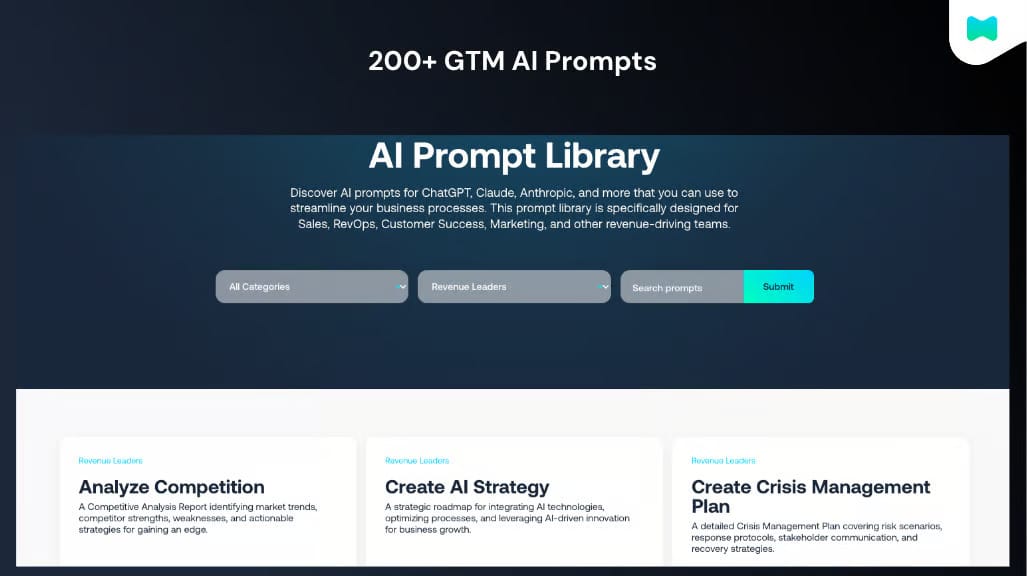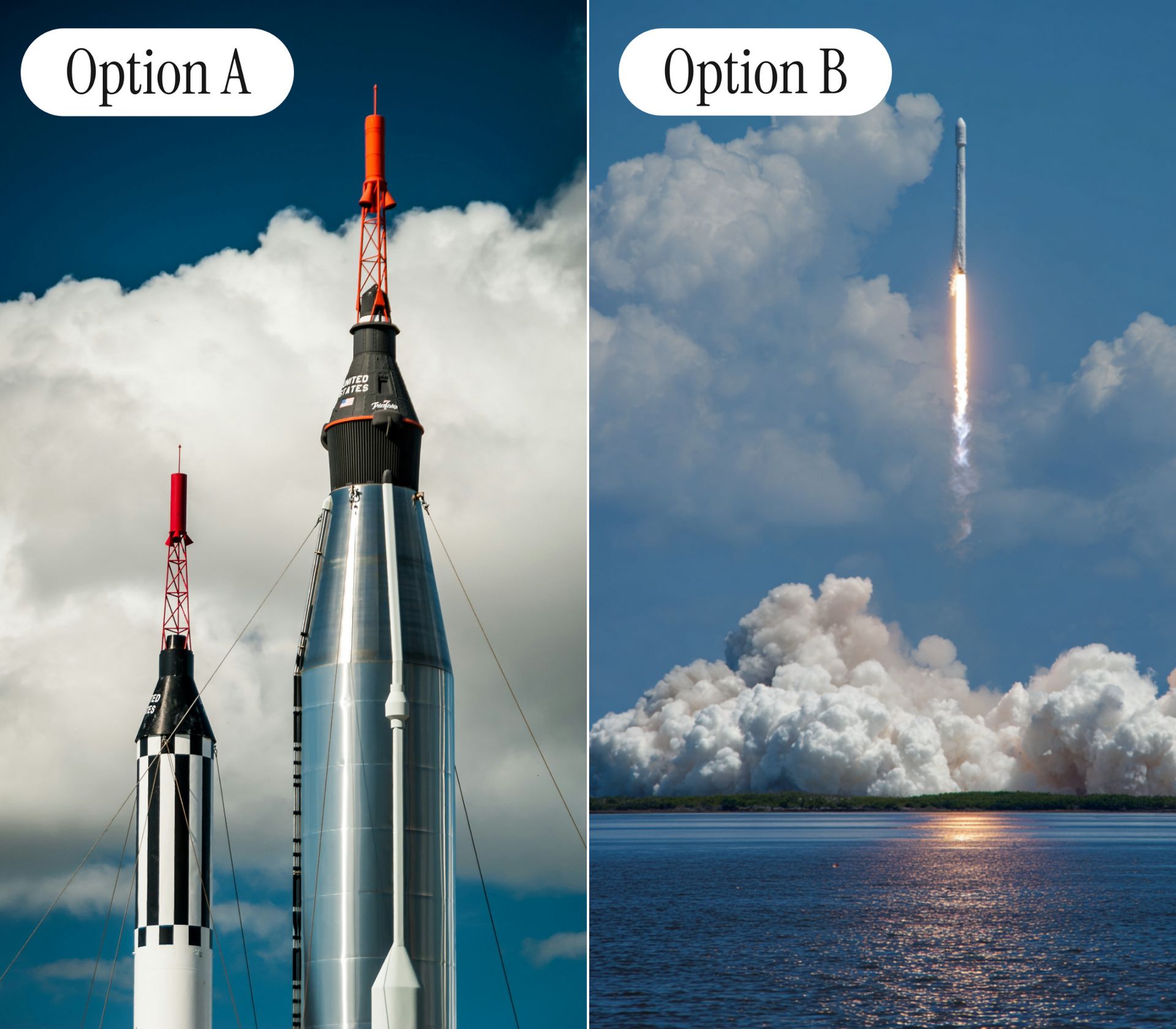- The Deep View
- Posts
- Trump bans 'ideologically biased' AI from government
Trump bans 'ideologically biased' AI from government
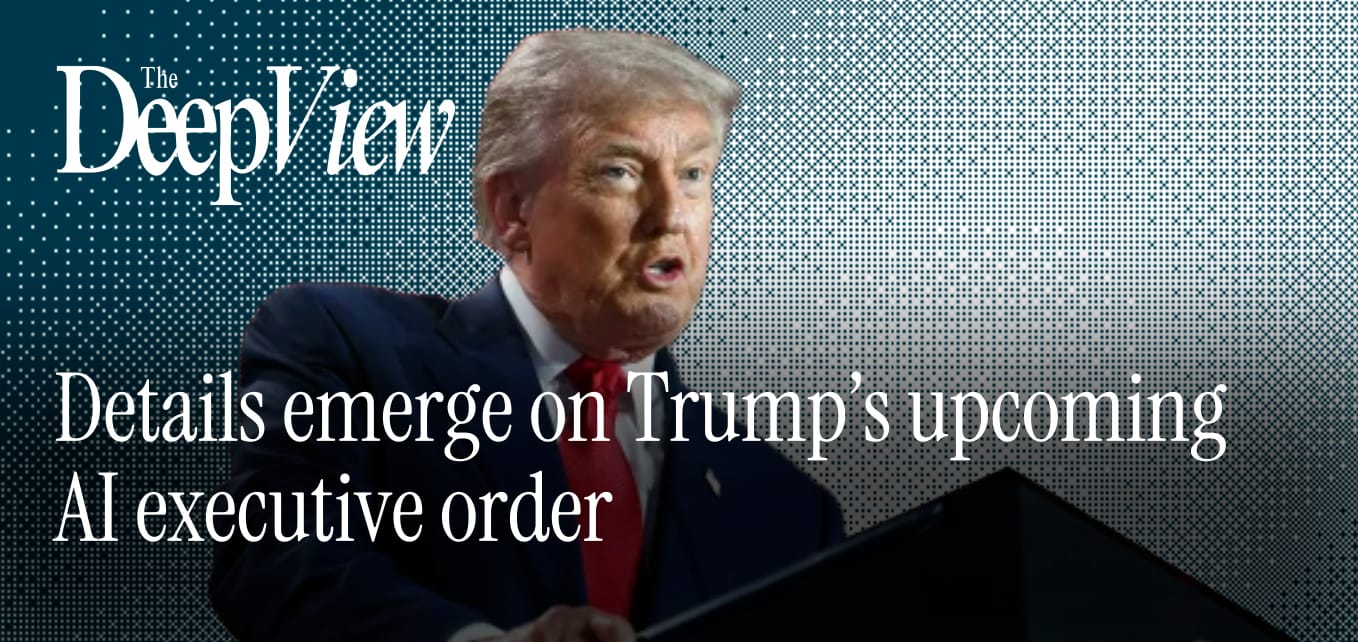

Welcome back. Peter Thiel's Founders Fund and Dragoneer just committed over $1 billion each to OpenAI's record-breaking $40 billion fundraising round, valuing the company at $260 billion before the cash injection. OpenAI is projecting it will spend $90 billion on servers alone between 2025-2027 and is already planning another $17 billion fundraise in 2027—because when you're burning through billions to train AI, the fundraising never actually stops.
1. Details emerge on Trump’s upcoming AI executive order
2. OpenAI quantifies ChatGPT's economic impact
3. Big Tech's Wednesday night split screen
LEGISLATION
Details emerge on Trump’s upcoming AI executive order
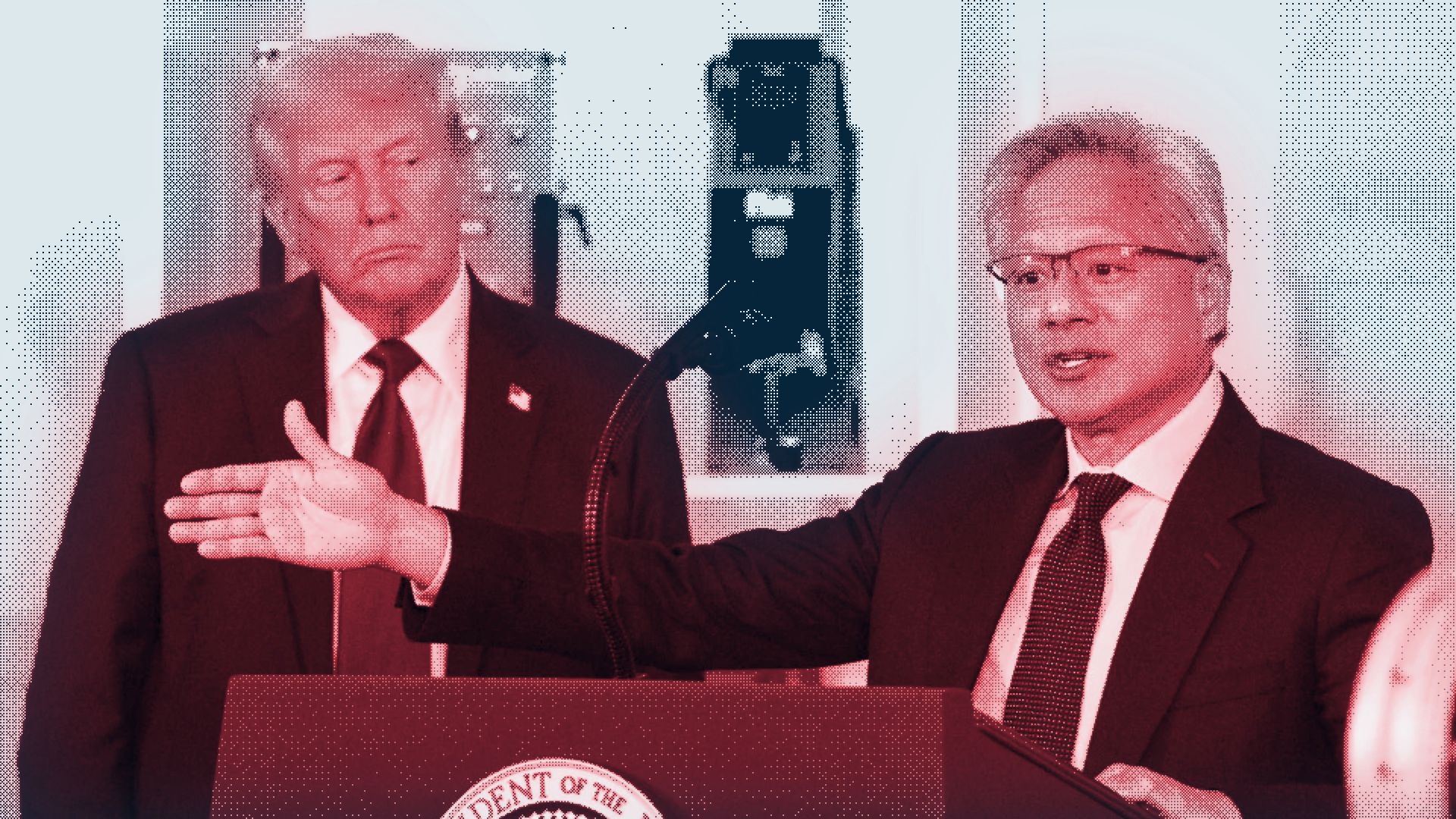
Silicon Valley got its Christmas wish in July. President Trump's AI Action Plan, unveiled Wednesday evening, delivers nearly everything tech companies have lobbied for while wrapping deregulation in the flag of national security.
Standing before tech executives, including Nvidia CEO Jensen Huang, Trump declared America would "win" the AI race. The plan delivers Silicon Valley's deregulation wishlist while targeting what conservatives see as ideological bias in AI systems.
The three executive orders tackle distinct areas. One bars federal agencies from purchasing AI tools the government considers ideologically biased. Another fast-track permits for major AI infrastructure projects. The third promotes American AI exports while restricting technology flows to China.
The administration will collect information on regulations that "hinder AI innovation" and withhold federal funding from states whose regulations reduce deployment effectiveness
Federal contracts will favor AI companies, ensuring their systems are "objective," with guidelines removing mentions of diversity, equity and inclusion
Data center construction will face fewer environmental regulations and gain new worker training programs
The timing reflects competitive pressure from Chinese AI firm DeepSeek, which recently shocked the industry by building powerful models with far less money than Silicon Valley thought possible, raising questions about whether massive infrastructure spending guarantees AI leadership.
Trump's approach directly contradicts the Biden administration's October 2023 executive order establishing safety and security standards for AI development. Within hours of taking office in January, Trump rolled back those protections, signaling preference for market-driven solutions over regulatory oversight.
The plan reflects broader tensions between American tech companies and international regulatory approaches. While the European Union has implemented comprehensive AI regulations, Trump's framework explicitly rejects such oversight in favor of systems "free of ideological bias."
This signals the administration's intention to reshape how AI models are trained and deployed. The move comes as tech companies face mounting legal challenges over using copyrighted content to train AI systems.

This plan represents a fundamental bet about technological leadership. The administration argues that speed and scale matter more than safety protocols when competing with global rivals. That logic has historical precedent in American innovation, from the space race to the development of the internet.
The approach creates clear winners and losers. Tech companies receive regulatory relief and faster approval for infrastructure. States with stricter AI rules face potential funding cuts. The question is whether removing guardrails accelerates meaningful innovation or shifts costs from companies to society.
The focus on eliminating "bias" reveals deeper tensions about who controls AI development. Every training decision involves choices about data and perspectives. The administration's approach doesn't eliminate bias so much as make different choices about whose values get embedded in these systems.
The real test will be whether deregulation delivers the competitive advantage Trump promises. If American companies can move faster while maintaining public trust, the strategy succeeds. If safety issues emerge or public confidence erodes, the approach risks undermining the leadership it aims to secure. The outcome depends on whether the technology cooperates with political timelines.
TOGETHER WITH MOMENTUM
Try This AI Prompt Cheat Sheet
A solid prompt can be the difference between confused agents and seamless workflow – but what constitutes a good one when it comes to AI? Great question.
With more than 200+ go-to-market-ready prompts specific to sales, customer success, marketing, or beyond, this library is your AI prompt cheat sheet. Use it to improve your existing prompts, uncover powerful new ones to immediately uplevel your agent output, or simply get a feel for what makes a great prompt successful.
It’s all free, and it’s all courtesy of Momentum.
ECONOMY
OpenAI quantifies ChatGPT's economic impact

OpenAI released its first economic analysis of ChatGPT's impact, drawing on data from 500 million users who send 2.5 billion daily messages. The report quantifies productivity gains from the company's own technology.
Key findings include:
Teachers save nearly six hours per week on routine tasks
Pennsylvania state workers complete tasks 95 minutes faster daily
Entrepreneurs are using ChatGPT to build new companies and startups
Over 330 million daily messages come from U.S. users alone
The analysis marks OpenAI's entry into economic research, with Chief Economist Ronnie Chatterji leading the effort. The study relies on case studies and user testimonials rather than comprehensive economic modeling.
OpenAI is also launching a 12-month research collaboration with Harvard's Jason Furman and Georgetown's Michael Strain to study AI's broader workforce impacts. This research will be housed in OpenAI's new Washington DC workshop, signaling the company's increased focus on policy engagement.
The timing coincides with mounting regulatory scrutiny over market concentration and legal challenges around training data. OpenAI faces copyright lawsuits from publishers and content creators, while policymakers debate how to regulate AI development.
The report aligns with broader industry projections about AI's economic potential. Goldman Sachs estimates generative AI could boost global GDP by $7 trillion, while McKinsey projects annual productivity gains of up to $4.4 trillion.
However, the analysis focuses on productivity improvements rather than addressing downsides like job displacement or implementation costs. The report acknowledges that "some jobs disappear, others evolve, new jobs emerge" but doesn't quantify these disruptions.
The company frames the research as ensuring AI benefits reach everyone rather than concentrating wealth. OpenAI is clearly positioning itself as a thought leader in debates about AI's societal impact.
TOGETHER WITH EIGHT SLEEP
Get an Extra Hour of Sleep with Eight Sleep’s Pod 5
If you haven’t heard of Eight Sleep, it’s time to wake up. Their smart sleep tech is changing the way people everywhere rest and recover, and their latest product may just be the most revolutionary yet: Introducing Pod 5.
Pod 5 is a high-tech smart cover that goes directly onto your mattress, instantly enhancing your existing bed with precision temperature regulation, sound control, sleep tracking, and even automatic elevation adjustment to help with snoring. Best of all, these high-tech perks have a purpose – the Pod has been clinically proven to improve quality sleep, giving you up to an hour of additional sleep every night.
Ready to sleep smarter? Hit this link and use code DEEPVIEW to get $350 off your very Pod 5 Ultra (and don’t worry, you get 30 days to try it and no-hassle return if you don’t like it).
EQUITIES
Big Tech's Wednesday night split screen

Three earnings calls, three completely different vibes. While Google executives celebrated another AI-fueled quarter and IBM quietly delivered solid results, Tesla's Elon Musk was busy making robotaxi promises that sounded more like science fiction than business strategy.
Tesla's reality proved less impressive than Musk's predictions. Vehicle deliveries dropped over 13% while revenue slid for the second consecutive quarter. The company's core auto business faces new headwinds as federal EV tax credits are set to expire in September, potentially forcing deeper price cuts.
Google flexes its AI muscles
Meanwhile, Alphabet delivered the kind of results that make competitors nervous. The search giant crushed expectations with revenue jumping 14% as Google Cloud continued its rampage against Amazon and Microsoft.
But the real story was Google's willingness to spend. The company bumped its 2025 infrastructure investments to $85 billion, essentially doubling down on the AI arms race. CEO Sundar Pichai says that Google plans to outspend everyone to maintain its lead. Cloud revenue surged past $13 billion, while YouTube advertising remained resilient despite concerns about AI competition.
IBM quietly wins
Lost in the Tesla drama and Google's AI theatrics was IBM's steady performance. The legacy tech giant exceeded expectations across the board, with its infrastructure business receiving a surprising boost from companies still purchasing expensive mainframe computers in 2025.
IBM's generative AI book of business has grown to $7.5 billion, proving that even traditional tech companies can ride the AI wave. Sometimes boring wins.
LINKS

Amazon quietly shuts down its AI research lab in Shanghai
Taiwan bets on AI to drive $510B in economic growth
Teens are turning to AI for friendship, advice and mental shortcuts
OpenAI’s Stargate takes shape as Oracle deal expands in Texas
Amazon snaps up Bee AI, the wearable that listens to your every word
Microsoft keeps swiping top AI talent from Google DeepMind
$93M goes to AI therapy startup from Casper’s co-founder
Gupshup lands $60M but still shy of unicorn status
Walmart hires Instacart executive to lead its AI ambitions
Meta’s new wristband lets you operate computers using gestures

Murf Studio: Speech-to-voice AI for creating professional voiceovers with adjustable tones and pauses
Pebblely: AI-powered mockup generator that places your designs onto realistic scenes and product templates
Fontjoy: AI font pairing tool that helps designers find harmonious typography combinations via GAN-generated suggestions
quso.ai: Short-form video editor with AI-powered clip detection, subtitles and auto-formatting for social platforms

Glean: AI Outcomes Manager
Hypernatural: Product Designer
CoreWeave: Senior Engineer, ML Infrastructure
Zapier: Sr. Brand Designer
POLL RESULTS
What’s your view on the UK’s decision?
Win (20%)
Short-term gain (29%)
Strategic error (25%)
Too early to judge (26%)
The Deep View is written by Faris Kojok, Chris Bibey and The Deep View crew. Please reply with any feedback.
Thanks for reading today’s edition of The Deep View! We’ll see you in the next one.

 | “The sand at the top of the timer should be concave (the sand subsides as the sand beneath is lost down the funnel). In the fake image, the sand is piled up in the middle. That makes no sense!” “It would be pretty damn strange if your hourglass was leaking sand everywhere.” |
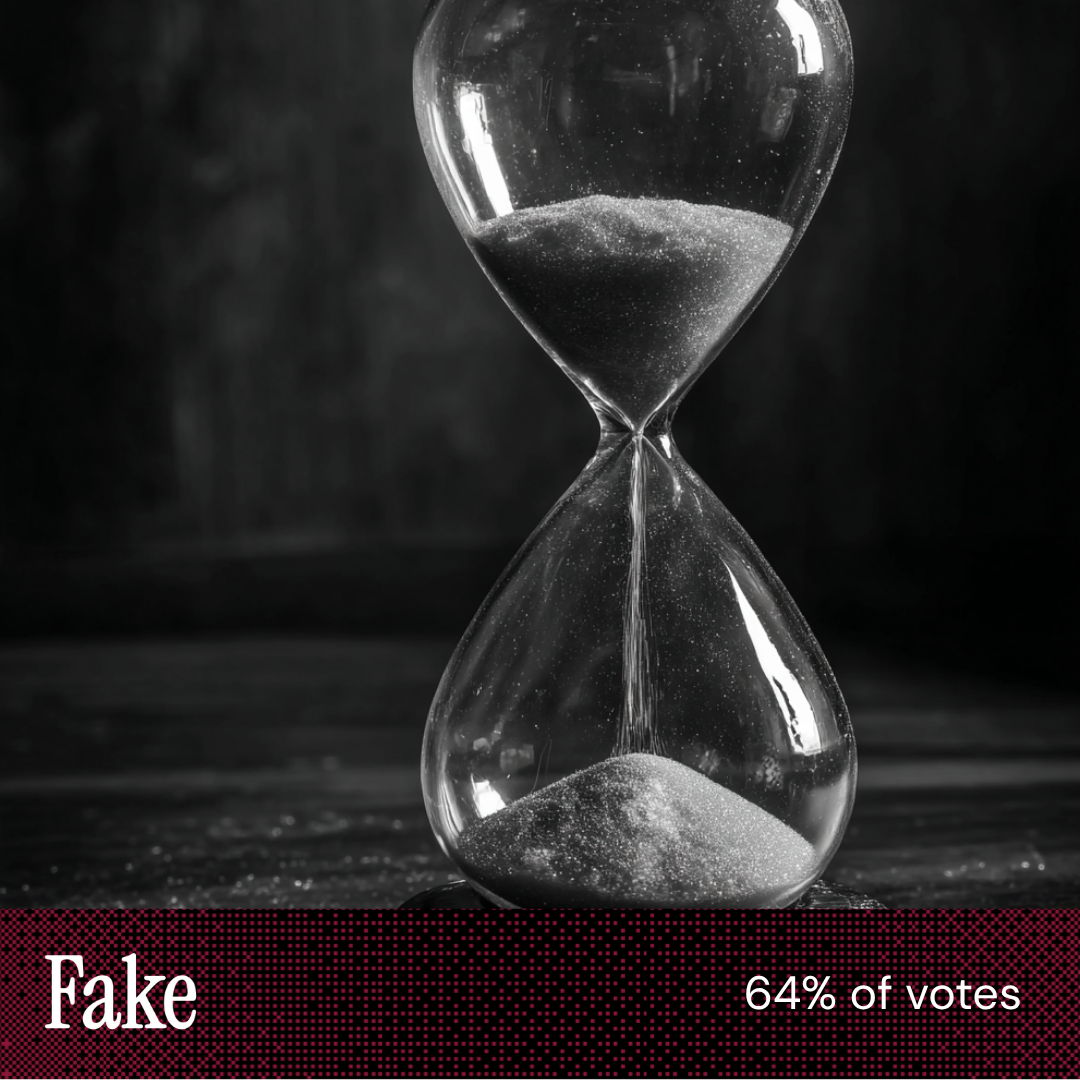 | “Wow, I still think the fake one looks more real. The details are outstanding, while the real one looks generated to me.” “Glass looks more realistic (dirty), and there is a light reflection on the glass.” |

Take The Deep View with you on the go! We’ve got exclusive, in-depth interviews for you on The Deep View: Conversations podcast every Tuesday morning.

If you want to get in front of an audience of 450,000+ developers, business leaders and tech enthusiasts, get in touch with us here.
